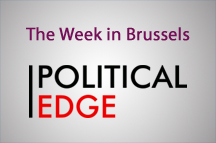 After last week's lack of progress, pressure is continuing to build ahead of the EU summit on 28-29 June. The momentum that was built between December (with the agreement on withdrawal) and March (with the agreement on a transition period until 2021) has truly been lost.
After last week's lack of progress, pressure is continuing to build ahead of the EU summit on 28-29 June. The momentum that was built between December (with the agreement on withdrawal) and March (with the agreement on a transition period until 2021) has truly been lost.
A solution on how to avoid a hard border on the island of Ireland is yet to be found, and nothing that happened this week suggests we are getting closer. The view in Brussels is that the British government and Conservative MPs are still negotiating among themselves. Both proposals put forward by London (‘Max Fac’ and a customs ‘partnership’) have been rejected by EU negotiators (twice in fact), and yet they remained the subject of furious debates in London. And while this goes on, very little happens in talks here in Brussels.
The bottom line is that on Northern Ireland we have essentially made no progress since January. On the one hand, the European commission's 'backstop' option would keep Northern Ireland in the customs union and large parts of the single market. On the other, the British government is arguing over two options to replace the customs union, and views Northern Ireland staying in the single market as anathema. And an EU summit, where the EU27 expect progress on the Irish border conundrum, is looming at the end of June.
 The row over the Galileo programme has further soured relations between negotiators. Galileo is the EU’s version of GPS, and as an EU member state, the UK invested about €1bn in the project. Now that it is leaving, it is losing access to some vital parts of the programme (essentially the encrypted signal used for defence purposes). This has infuriated London, which may ask to be reimbursed for its investment and is threatening to start its own version of the programme. EU negotiators, on the other hand, retort that the rules governing access to Galileo were agreed by the UK as a fellow EU member. And the rules state that non-EU members cannot access sensitive parts of the programme.
The row over the Galileo programme has further soured relations between negotiators. Galileo is the EU’s version of GPS, and as an EU member state, the UK invested about €1bn in the project. Now that it is leaving, it is losing access to some vital parts of the programme (essentially the encrypted signal used for defence purposes). This has infuriated London, which may ask to be reimbursed for its investment and is threatening to start its own version of the programme. EU negotiators, on the other hand, retort that the rules governing access to Galileo were agreed by the UK as a fellow EU member. And the rules state that non-EU members cannot access sensitive parts of the programme.
The current deadlock is very similar to the period leading up to the December EU summit. Brussels is quietly confident that ultimately the UK government will back down and agree to most of the EU's demands, as it did then. The risk, of course, is that the Northern Ireland 'backstop' solution put forward by Michel Barnier's team is so unpalatable to the British government (and its backers in Belfast) that concessions will not be forthcoming. Come the end of June, we may find that the EU27 decide that talks on the future trade relationship cannot proceed further. That is the worst-case scenario, and fortunately there is still plenty of time to avoid it.












